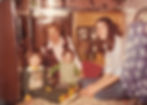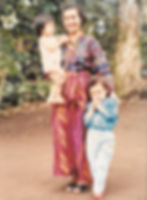
What It Means to be American
Jul 7, 2025
3 min read
Some time ago, I hopped off a plane at JFK with nothing but two suitcases and a head full of dreams. I was chasing a life I could build on my own terms—armed with little more than faith and that very Filipino concept of 𝘱𝘢𝘬𝘪𝘬𝘪𝘱𝘢𝘨𝘴𝘢𝘱𝘢𝘭𝘢𝘳𝘢𝘯: the willingness to risk, to hope, and to bet on a future in unfamiliar terrain.

Coming to America for the first time — September 9, 2013.
This year, I’m celebrating the Fourth of July for the first time as an American citizen. I took my oath last fall. I stood alongside others—strangers in origin but united by choice—and pledged allegiance to a country that has, in many ways, changed the course of my life. I’ve built a home here. I’ve launched projects rooted in both my culture and my convictions.

Naturalization Ceremony — September 6, 2024 at the Ulster County Courthouse.
And I’ve joined a family whose story, like mine, is threaded with migration. My husband’s grandmother came to this country seeking refuge and opportunity. His mother, too, came to be with the man she loved. And now, I stand beside them as the third immigrant woman in our family—each of us having arrived in a different era, under different circumstances, all adding to the quiet, steadfast labor of love that makes up the fabric of America. We are far from the only ones. Our stories echo through kitchens, classrooms, subways, and sidewalks across this nation.

Second from left: Regina Weinstein—born Ryfka—my husband’s grandmother, who arrived in the U.S. from Poland in 1920 aboard the S.S. Nieuw Amsterdam. Far right: Ellen Isabel, my husband’s mother, who emigrated from France in 1974 with just the clothes on her back. Two generations of immigrant women whose courage and love shaped the man I would one day marry—and the family I now belong to.
Yet for me, this day isn’t so straightforward. It’s layered with my people’s heritage and history.
As a Filipino American, I carry the legacy of a homeland that was once a colony of the United States. In 1898, Filipino revolutionaries fought alongside American forces to end 333 years of Spanish rule—only for the islands to be claimed by the U.S. shortly after. What began as a war for liberation became a new chapter of occupation. By July 4, 1902, the Philippines was officially under American control.
Nearly five decades later, on July 4, 1946, the U.S. granted the Philippines its independence—on the same date it had once taken it away. That symbolic mirroring was no coincidence. It tied our sovereignty to theirs, but not on our terms. In 1962, President Diosdado Macapagal restored June 12 as our true Independence Day—the day we declared freedom from Spain. July 4 was renamed “Philippine-American Friendship Day,” a phrase that has always felt more diplomatic than liberating.

Lake Sebu, late 1980s to early 1990s. My mother worked closely with the Tboli Indigenous community during our years living here—years that shaped so much of my understanding of culture, kinship, and home.
So when I wave an American flag on July 4, I feel both pride and discomfort. I think about the power of this country to create opportunity—and the violence it has committed in pursuit of empire. I think about my immigrant story—and the Indigenous stories buried beneath every sidewalk, every state line.
Here in New Paltz, New York, I live on what was once Lenape land. The Esopus band of the Munsee Lenape lived and cared for this valley for generations before treaties displaced them and settlers renamed the earth beneath their feet. That legacy, too, must be part of our national consciousness—especially today. Because if we only celebrate freedom without remembering whose freedom was taken, we are not telling the truth.

To be American is to live in contradiction: freedom beside injustice, progress beside denial. It’s easy to stop at fireworks and flags. Harder to face the mirror. But to love a country is to want it to do better. To become worthy of all the hope it still attracts.
No matter how we arrived—by plane, by foot, by ancestry or accident—most of us came here with a vision of a better life. That longing, that dream, that 𝘱𝘢𝘬𝘪𝘬𝘪𝘱𝘢𝘨𝘴𝘢𝘱𝘢𝘭𝘢𝘳𝘢𝘯, lives in every generation.
And so I speak out.
Because we all must.
So we remember.
So we build something honest.
So we become the country we say we are.
About the Author: 𝘊𝘦𝘤𝘪𝘭𝘭𝘦 𝘊𝘢𝘴𝘵𝘪𝘭𝘭𝘰𝘯-𝘞𝘦𝘪𝘯𝘴𝘵𝘦𝘪𝘯 𝘪𝘴 𝘢 𝘍𝘪𝘭𝘪𝘱𝘪𝘯𝘰-𝘈𝘮𝘦𝘳𝘪𝘤𝘢𝘯 𝘸𝘳𝘪𝘵𝘦𝘳, 𝘤𝘰𝘮𝘮𝘶𝘯𝘪𝘵𝘺 𝘰𝘳𝘨𝘢𝘯𝘪𝘻𝘦𝘳, 𝘢𝘯𝘥 𝘧𝘰𝘶𝘯𝘥𝘦𝘳 𝘰𝘧 𝘛𝘩𝘦 𝘋𝘳𝘦𝘢𝘮𝘸𝘦𝘢𝘷𝘦𝘳 𝘊𝘰𝘭𝘭𝘦𝘤𝘵𝘪𝘷𝘦, 𝘢 𝘯𝘰𝘯𝘱𝘳𝘰𝘧𝘪𝘵 𝘶𝘱𝘭𝘪𝘧𝘵𝘪𝘯𝘨 𝘐𝘯𝘥𝘪𝘨𝘦𝘯𝘰𝘶𝘴 𝘢𝘳𝘵𝘪𝘴𝘢𝘯𝘴 𝘢𝘯𝘥 𝘺𝘰𝘶𝘵𝘩 𝘪𝘯 𝘵𝘩𝘦 𝘗𝘩𝘪𝘭𝘪𝘱𝘱𝘪𝘯𝘦𝘴. 𝘉𝘰𝘳𝘯 𝘪𝘯 𝘓𝘢𝘬𝘦 𝘚𝘦𝘣𝘶, 𝘚𝘰𝘶𝘵𝘩 𝘊𝘰𝘵𝘢𝘣𝘢𝘵𝘰, 𝘴𝘩𝘦 𝘯𝘰𝘸 𝘭𝘪𝘷𝘦𝘴 𝘪𝘯 𝘕𝘦𝘸 𝘗𝘢𝘭𝘵𝘻, 𝘕𝘦𝘸 𝘠𝘰𝘳𝘬, 𝘸𝘩𝘦𝘳𝘦 𝘴𝘩𝘦 𝘭𝘦𝘢𝘥𝘴 𝘤𝘰𝘮𝘮𝘶𝘯𝘪𝘵𝘺-𝘣𝘢𝘴𝘦𝘥 𝘱𝘳𝘰𝘫𝘦𝘤𝘵𝘴 𝘢𝘤𝘳𝘰𝘴𝘴 𝘵𝘩𝘦 𝘏𝘶𝘥𝘴𝘰𝘯 𝘝𝘢𝘭𝘭𝘦𝘺 𝘢𝘯𝘥 𝘵𝘩𝘦 𝘜.𝘚. 𝘵𝘩𝘢𝘵 𝘤𝘦𝘯𝘵𝘦𝘳 𝘤𝘶𝘭𝘵𝘶𝘳𝘢𝘭 𝘩𝘦𝘳𝘪𝘵𝘢𝘨𝘦, 𝘴𝘰𝘤𝘪𝘢𝘭 𝘦𝘲𝘶𝘪𝘵𝘺, 𝘢𝘯𝘥 𝘪𝘯𝘵𝘦𝘳𝘨𝘦𝘯𝘦𝘳𝘢𝘵𝘪𝘰𝘯𝘢𝘭 𝘣𝘦𝘭𝘰𝘯𝘨𝘪𝘯𝘨.







